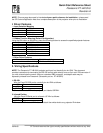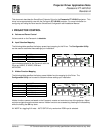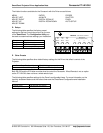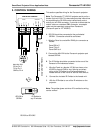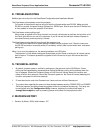
SmartPanel Projector Driver Application Note
Panasonic PT-LB10VU
© 2005 SP Controls Inc. 601 Minnesota Suite 115, San Francisco, CA 94107
help@spcontrols.com
III. TROUBLESHOOTING
Addition tips can be found in the SmartPanel Configuration and Installation Manual.
The Panel does not completely control the projector..
Full control of the projector requires wiring of both the infrared emitter and RS-232. Make sure that
RS-232 is correctly connected through Panasonic’s SERIAL port. Also be sure that the IR Emitter bud
is firmly seated on one of the projector IR windows.
The Panel does not do anything at all.
When power is applied to the Panel it should run through a brief power on self-test, during which all of
the Panel lights will turn on and off in sequence. If you do not see this self test, make sure power is
connected correctly and that polarity is correct.
The Panel keeps turning itself off even though the projector is on.
The Panel turns itself off when power polling indicates that the projector is off. Check to make sure
the RS-232 connection is correctly wired (it is extremely unlikely other control would work, and power
polling not).
When I try to turn the projector on, the warming indicator (red LED) blink.
The projector is in the default configured lockout state, and the Panel is waiting for its internal lockout
timer to expire. This feature protects the projector’s bulb. Be sure to let your client know about this
behavior.
IV. TECHNICAL NOTES
1. By default, projector power is verified by polling every few seconds via the RS-232 port. Power
polling can be suspended by depressing and holding the On key; polling will be restored when the
key is released. Should the Panasonic power off, the Panel will usually detect this condition and
power off within thirty seconds. Should the Panasonic power on, the Panel will usually detecting this
condition and power on within ten seconds.
2. IR must be wired to control the Panasonic as it does not have a Wired Remote port.
3. The lockout timer specifies the amount of time allowed between sending POWER OFF and POWER
ON to the projector (the delay allows the projector bulbs to cool before re-powering). This delay can
be configured using the Configuration Utility; however, adjusting the lockout timer delay is
strongly discouraged as rapid re-powering causes undue wear on the projector’s bulbs.
V. REVISION HISTORY
1. Revision A (March, 2005) Initial release. - BT



